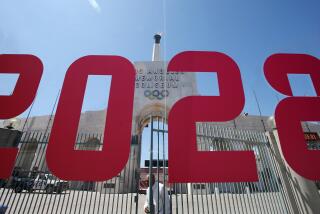London’s Olympic countdown begins in earnest
LONDON — As a longtime Londoner but not much of a sports fan, Elaine Potter has cast a mostly skeptical eye over the Olympics and all the related fuss — the omnipresent marketing, the endless media coverage.
But gazing out over the shiny new stadium in London’s East End for the first time this week, with a friend who dragged her to go see it, Potter admitted to some second thoughts.
“It’s looking good,” said Potter, 56, who’s tempering her opinion of the Games as one big headache. “I think it’s quite good for London and for making London known.”
On Wednesday, 100 days before the July 27 opening ceremony, the countdown begins in earnest for the world’s biggest sporting event — and for the organizers charged not just with making sure venues and volunteers are ready but also with getting residents like Potter to feel excited about it and to change the way they live and work, at least temporarily.
So far, except for a few glitches, the Olympic rollout has gone fairly smoothly, a showcase of British know-how and efficiency, officials say. Construction on several new stadiums is finished or nearly there, an extensive transportation plan is being refined, a massive security operation is underway and tickets have sold like hot cakes.
But there’s little room to take anything for granted here in one of the world’s most densely packed and gridlocked cities, a magnet for tourists and terrorists alike.
And London’s status as an expensive destination has been amply borne out by the Games’ price tag, which started at less than $4 billion but has been marked up several times to the latest figure, a whopping $15 billion. Critics say that could rise to as much as $21 billion in the end, which, though only half of what China spent on the 2008 Olympics in Beijing, is an immense sum in a time of the harshest government cutbacks in a generation.
Recently, a parliamentary report warned that the Olympic budget was “finely balanced,” in danger of tipping into the red if organizers weren’t vigilant.
The delicate financial situation, lawmakers said, is due almost entirely to a single factor: security.
A year and a half ago, the organizing committee confidently signed a contract with a security company worth about $136 million. But the estimated cost of keeping the Olympics safe has since skyrocketed to $875 million, in part to hire twice the number of guards originally thought necessary to patrol venues.
Mindful that the Games and London make a juicy “two for one” target for terrorists, the government has pledged 7,500 British troops to back up the guards at the various arenas. That has led to fears of an overly intrusive security presence in a city already blanketed by surveillance cameras.
“Our first priority must be to keep people safe, and we will be mobilizing every aspect of our security infrastructure,” Prime Minister David Cameron said last month. “But it will be done in a way that is sensitive to the spirit of the Games.”
The ballooning security costs have put organizers on notice, though some Londoners snorted in derision when Sebastian Coe, the former gold medalist who runs the planning committee, said in December that the Olympics would “be living hand-to-mouth.”
The event’s eye-popping budget is a far cry from the last time the British capital hosted the world’s top athletes, 64 years ago.
In 1948, the country still hadn’t emerged from the shadow of war, and the depleted treasury meant it was forced to put on the “Austerity Olympics,” with frugality as the watchword. Not a single new stadium was built, nor an Olympic village. Some national teams even brought their own food; the French, naturally, carted in their own wine.
Yet the event was a triumph — it even turned a profit — and gave a major boost to British confidence, a success today’s organizers are fervently hoping to replicate.
In many ways, more thought has gone into how to capitalize on the Olympics’ high profile, afterglow and infrastructure than any previous Games. The bid committee’s plans for the Olympic “legacy,” particularly how the new stadiums will be put to use after all the visitors go home, were key to winning the hosting contest back in 2005.
Many of the new venues are concentrated in East London, a deprived area once described as an “urban desert” littered with ramshackle housing projects and pools of fetid water. Because of the Olympics, a huge shopping mall, an athletes’ village that will be turned into apartments, a new school and other improvements have sprung up or are being planned.
The 80,000-seat main stadium sits in the largest green space created in London in centuries. Officials like to point out that the Olympic Park was built ahead of schedule and under budget.
“We’ve busted the myth that Britain can’t deliver a project like this,” said Alan Collins, managing director of Olympic legacy for the U.K. Trade and Investment office. “It would be very hard to sustain the argument that the Games aren’t going to leave a lasting legacy for London.”
As of now, no one has been tapped to take over the big stadium after the Games; a promising bid by a local soccer team collapsed last year. But several new applications have been submitted, and a winner is expected to be announced before the Olympics begin.
“Instead of having a white elephant stadium, we’re having people arguing over who gets to use it,” said Collins.
He’s been traveling the world to drum up investment in Britain on the back of the Olympics. The government forecasts an extra $1.6 billion for British business as a result of the Games and double that amount in increased tourism receipts, figures that some analysts dismiss as too optimistic.
A feel-good effect for the economy will be possible only if people actually feel good about their experience of London, of course, and a crucial part of that will rest on how well the city manages to move people from one place to another during the Games.
London’s famous Underground records about 4 million journeys a day, and residents are already accustomed to complaining about overcrowded trains and tortoise-like car traffic without the 9 million spectators that the Olympics are expected to draw.
Ten rail lines serve the Olympic Park area. But visitors are being warned that they may have to wait as long as half an hour at peak times to board a train at some Underground hubs. Officials are hoping that regular passenger levels will drop by as much as 30% during those times to compensate for the increased load.
But getting commuters and other residents to change ingrained habits could prove tough.
Transport officials now have 100 days to improve on a recent poll showing that only one out of eight Londoners has thought about how to modify their travel patterns to cope with the Games.
Many businesses have already begun making alternate arrangements for freight deliveries. Others are experimenting with telecommuting rotations for their workers.
“Everyone who will be traveling around central London needs to assume that the transport will be different” from what they’re used to, said Mark Evers, who’s in charge of the Olympics at Transport for London. “We’re confident we’re getting our message out there.”
Olympic organizers are therefore in a tricky position: They want to promote Londoners’ enthusiasm about the big sporting extravaganza in their backyard, but not get them so excited that too many pour into the streets and onto trains and bring the city to a standstill.
Some bumps will probably be inevitable, but Collins is confident that the Games’ glow has already begun.
“It would have to be a pretty major glitch to knock the shine off,” he said. “We’re going to stage a great Olympics.”
More to Read
Get our high school sports newsletter
Prep Rally is devoted to the SoCal high school sports experience, bringing you scores, stories and a behind-the-scenes look at what makes prep sports so popular.
You may occasionally receive promotional content from the Los Angeles Times.







